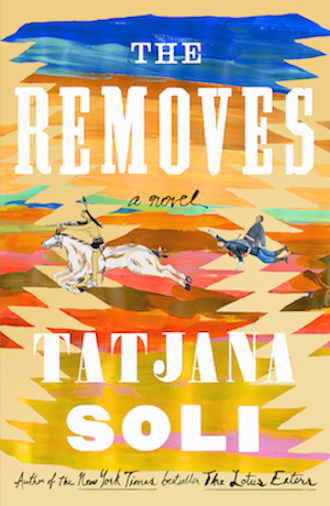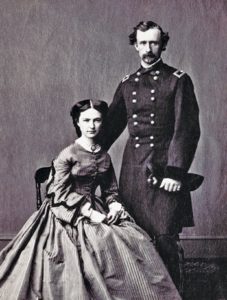
Perhaps due to my California roots, I’ve always been a bit of a sucker for American West / frontier / pioneer kinds of historical novels and I finished a couple of good ones last year with Paulette Jiles’s “News of the World” set in Texas after the Civil War, and Sebastian Barry’s “Days Without End,” about two Irish boys fighting for the U.S. Army in the Indian and Civil Wars. I had also previously tore through Daniel James Brown’s nonfiction saga about the Donner Party “The Indifferent Stars Above,” which was also quite gut-wrenching. So when given the opportunity, I jumped at the chance to read and review Tatjana Soli’s new historical novel “The Removes,” which takes place right as the Civil War is ending and the U.S. government is setting its sights on Native American territories across the Great Plains … uh-oh.

The story chronicles the lives of Gen. George Custer, a hero of the Civil War who’s sent to defeat and remove the Indians, and his recently wedded wife Libby, who follows him to military outposts across the frontier. It interweaves their lives in alternating chapters along with those of a young daughter of Kansas settlers (a fictitious character) named Anne, who’s abducted by the Cheyenne and is living as a captive among the tribe.
I found “The Removes” to be quite a fascinating and illuminating read about all three, especially since I didn’t know much about Custer and his wife in such detail before, other than his demise with his troops at the Battle of Little Bighorn in 1876. I liked how the novel vividly conjured up their lives, relations, and travels as well as the battles Custer fought in the years leading up to Little Big Horn. It certainly captures how hard and violent life was like on the American frontier during the 1860s and ’70s. For those feint of heart, you might have to skip over the various graphic parts of this tale — as it doesn’t shy away from the atrocities that were committed by whites and natives alike during these years.
I also learned quite a bit about Custer himself and what he did and how others were affected. He seemed a contradiction of sorts: he traveled endlessly to fight and kill Indians or to relocate them and yet by the end he was close to Native scouts who worked with him and he took a Native mistress. Moreover he seemed more at home with life on the frontier, living similarly like the natives than he did back in the civilized world. He was close to his brother, Tom, who he liked to play pranks on and who served under his command in the 7th Cavalry Regiment during the Indian Wars, and to his beloved wife, the apple of his eye. Libby too seemed quite hearty and survived the elements at desolate outposts and in storms often waiting for her “Autie” — Custer’s nickname — to return from his missions.

© MEDFORD HISTORICAL SOCIETY COLLECTION/CORBIS
Theirs was quite a love story — Libbie and Autie’s, which quite surprised me in reading “The Removes.” I hadn’t known about her before. They had met each other in their hometown of Monroe, Michigan, and married in 1864 as he was becoming a war hero in the Civil War. Despite long absences on the Plains when he was off scouting for Indians and she was back at the fort, they seemed very devoted to one another … no matter the infidelities, or hell or high water. Custer even was once court-martialed for leaving his post to make a long distance journey to return to his wife. Libby and Autie made the most of their times when they could be together, though theirs was often a difficult life with scant supplies at times on the frontier and under very hard conditions.
It was none more difficult than Anne’s life. As an Indian captive chronicled in “The Removes,” she lives through years of horrific hardships with the tribe, being mistreated (along with raped) and trying not to starve while oftentimes being uprooted and on the move. Eventually she earns some degree of recognition as a seamstress and bears two children, while biding her time trying for an escape. Her life is quite unsettling and violent as are many of the battle scenes in the novel. You don’t know what will happen when her world collides with Custer’s, but it seems certain with time that she’s caught between two worlds — those of whites and natives — that she cannot fully return from.
I liked much of the evocative writing of the characters’ frontier lives in “The Removes,” though the chapters with Custer and his wife seemed a bit more like reading history, while other parts such as the parts with the captive girl Anne flowed more like fiction. It’s not a fast read by any means; it’s quite an expansive take, but it catapulted me along with it. By the end, it seemed both a harrowing and tragic look at an expansionist policy that took both sides and these three characters down a dark path of no return — as well as a sad and affecting look at the disappearing way of life on the Great Plains. I could have used a bit more at the end about the climax of what happened at the Battle of Little Bighorn, but overall I found “The Removes” a very well-researched and affecting historical read.
I recommend it especially for those who like stories about the American frontier. I hadn’t read Tatjana Soli before but I was impressed and hope sometime to read her acclaimed 2010 debut “The Lotus Eaters,” about a female combat photographer in the Vietnam War.
Thanks to TLC Book Tours for involving me in the book tour of this novel and to the Publisher Sarah Crichton Books for providing me with a review copy of Tatjana Soli’s “The Removes.” For other reviews of the book check the link here.
Coincidentally while I was reading about Libby Bacon Custer, I was also listening to the audiobook of Charles Frazier’s novel “Varina,” about Varina Davis, the wife of the President of the Confederacy, Jefferson Davis. Wow both of these strong-willed women seemed to have some unique sensibilities for their times. I like how I came about these two at the same time. Both had compelling life stories — as partners of men on the wrong side of history. My review of “Varina” will come out later.
What about you — have you read any of Tatjana Soli’s novels and if so, what did you think?

What an amazing review! I’m very interested in this book as I read and loved THE LOTUS EATERS some time ago (I read and discussed it with my book club.) Thank you so much for being on the tour!
Thanks Lisa. I found The Removes quite fascinating and I’ve heard such great things about The Lotus Eaters, so I must get to it soon. It was great to be on the book tour!
Well, these are two books I have high on my lists. The Lotus Eaters was the best book I had ever read about the Vietnam War, until I read The Sympathizers. The two are now tied for best-:) Charles Frazier is a beloved author for me. I have read all his novels and each one has been great. So it’s time for me to get back to the Civil and Indian Wars. Great review!
Thanks Judy. Good to know about The Lotus Eaters! I must get to it. This one was good as well /much research! Yeah I thought The Sympathizers had a lot to it and was great. Charles Frazier is amazing. This Varina novel is wonderful. I’ve only read his Cold Mountain before this but now I need to get all of his novels. Ha. Hope you like these.
I’ve never read a book set in the “wild” west and I’m not sure why – my dad loved the genre.
Perhaps you like Southern fiction better. I find these frontier stories very adventurous and filled with the natural elements, which awes me. I never thought I was big on historical fiction but now I’m getting into the genre!
Love your review. I had no idea what The Removes was about. I have seen the cover everywhere but I guess I paid little attention to what it was actually about.
Thanks Ti. It’s definitely a book that opened my eyes about George Custer and what he did and was about. I haven’t seen too many reviews of it yet, but from what I saw on Goodreads a few readers had trouble with the graphic / violent nature of the content … of the Indian Wars as written about in it. But I found it was better not sugarcoating it. It was obviously well researched & seemed an accurate portrayal.
Great review, Susan. The Removes sounds like an affecting read. I would love to read it. I have Varina on my TBR. Let’s see when I can accommodate it.
Thanks Carmen. Yeah both this one & Varina are historical fiction — which is a genre I’m starting to get into these days. Not sure why, but I find it compelling when done well. I guess I can also learn a bit from such novels, or at least reacquaint my memory. Have a great week.
This sounds so interesting. I have not read a lot of fiction about this time and place. The little bit of non – fiction that I have read that touches upon Custer has made him sound pretty bad. I need to read and learn more however. Custer and Little Big Horn occupies such a prominent place in American mythology. That fact, in and of itself makes this sound intriguing.
Yeah Brian: I felt I learned quite a bit about Custer from this well researched novel. The author seems to de-mythologize a lot surrounding all the hype about him. But you’re right: Custer seems to have carried through some harsh or genocidal policies at the bequest of the U.S. gov’t. There was a lot of revenge on the Plains: one side would do one thing and the other side would do payback. It was grisly. I wouldn’t mind reading Philbrick’s book about Custer, or Evan Connell’s Son of the Morning Star. He’s quite a figure in history.
Well you just sold me on The Removes… I had no idea it was about Custer! We visited the Little Bighorn Battlefield and Indian Memorial on our Great Western Adventure a few years ago. I’ll happily read more about it… such a fascinating period in our history.
Your post also jogged my memory about The Lotus Eaters. I purchased the audio version during one of audible’s BOGO sales (must be years ago now) and never listened to it. It’s still waiting in my library… this is my lucky day! 😉
Hi JoAnn: it seems our reading always dovetails … and we often like the same books :-). I’m envious that you got to tour around at Little Bighorn Battlefield. I want to do that. If you’ve been there — then I think you’d like this novel! I’m still a bit curious about Custer. And now I definitely want to check out The Lotus Eaters. I’m impressed with her writing.
This author does pick interesting topics and original POVs. The Removes might be a bit to upsetting for me to read. Thanks for the review!
Hi Sarah, good to hear from you. I can understand that it could be too upsetting for some readers. It’s definitely a violent and graphic tale — about the settling of the American frontier. Some readers on Goodreads commented that it was too much for them — violence wise. But I guess I’m glad to know a little more about the history.
The only book I’ve read by her is The Forgetting Tree, which I thought was a very odd book that was just okay. This book sounds completely different.
Hi Rachel: I just looked up The Forgetting Tree on Amazon — looks like a bit of a crazy premise. Hmm, thanks for telling me about it. I agree: this new book is quite a departure from that. It has a lot of history to it. Apparently her most acclaimed book is her first one — The Lotus Eaters, which I hope to eventually get to.
I’m intrigued by The Removes. Having visited the Little Big Horn site a couple of times, I really have a hard time being at all sympathetic to Custer and his troops, but his wife fascinates me. I have a copy of her book, Boots and Saddle, which I would love to read next year.
My husband just finished Varina, and absolutely loved it, so I am hoping to read it in Nov.
Hi Jane, thanks for your comments. Yes if you’ll have to get The Removes if you’re interested in Libby Custer. It’s quite a tale about her but has some harshness to it too — about the battles etc. And I agree with your husband, the book Varina is so good! One of my favorites of the year so far. Glad you plan to get to it.
I do love good historical fiction like this, especially ones that focus on women!